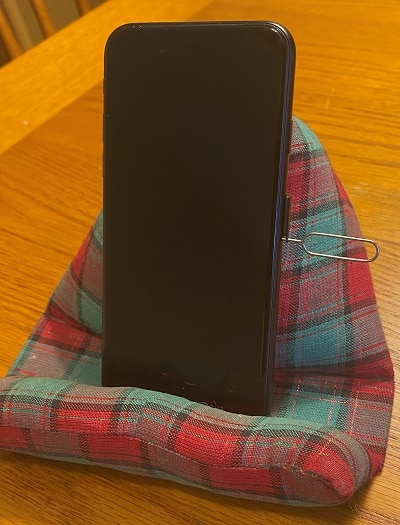Not long ago my wife informed me that we were changing our service and getting new phones. She explained the reason, but I still don’t know why. I think her need to acquire the latest phones of this future is another of her hobbies. Or, by the very nature of the product, she has to buy new to keep up with the technology.
That said, my phone lasted for six years, according to T-Mobile, our new provider, and is why they didn’t accept it as a trade-in. It was too old, so I got it back. My wife handed me her old phone, which was one year old (but the back was cracked and so T-Mobile didn’t want that, either) and told me to dispose of it, meaning I should get rid of the Subscriber Identity Module (SIM) card. She set it on my desk, and then I remembered I had other old phones in a drawer: two flips, two slides, and now three flat phones that are almost impossible to pick up from a table without long fingernails.
My new one is bigger and heavier, and I don’t like that. But it’s mostly the same. Except that when I had to help my grandson with a geometry problem, I discovered my new phone doesn’t have the science calculator. I used to be able to turn my old phone on its side and bring it up. But no more! Nor can I turn it to make a picture flip ninety degrees and fill the screen, and so far I can’t discover how to activate that. Perhaps they forgot to include both.
And a big difference is the battery. The flat phones, I discovered, don’t have replaceable batteries. They don’t even have removable cases; I had to crack them open with a chisel. The battery is glued to the back cover and feels like a wafer of clay coated in plastic. I could dent its surface with a fingernail, and when I poked it with the point of my pocket knife, the hole I made flared like an arch-welder. Only then did I read the small print on its front that said do not puncture the battery.
But there is one good thing I learned from disassembling a flat phone: the use of the little paperclip-looking piece of wire. I’d seen it before and thought it was some sort of antenna. This time, finding it in the box of my new phone, I wondered what it could really be. As all of you know, for many years now such technological wonders have not come with a manual, just a quick-start card, and that’s something about this future that I don’t like: that to understand a device, you first have to learn how to use it all by yourself.
I had noticed a small hole on the side of my old flat phone, and it was there on my new phone. It was at one end of what looked like a small drawer, and I had pushed that many times on my old phone to see what it would do. It always did nothing. This time I noticed that the hole was the same size as the wire, so I INSERT IGNOREed it, pushed it, and the SIM popped out. Wow. You know what? That should be on the quick-start card!
I used my new wire to retrieve the SIMs from the old flats, and cut them up. The SIMs of the older phones were removable with a finger, push and pull, along with the batteries, and I scissored those cards, too. Concerned about lithium, I found out that Home Depot has a drop box for such batteries. After long weeks of the four loose batteries and the three back-attached batteries sitting on my desk, I finally had to go there to get more landscape logs for my wife’s garden, and was able to discard the batteries then. At my store, the box is just inside the entrance next to the customer service counters.
I had a kitchen phone that lasted 37 years, and the only reason it’s not on the wall now is because manufacturers of this olden walkie-talkie technology, renamed “Cell Phones,” have convinced us, via media, to switch. (Cell refers to the mobile tower, or base transceiver station, basically the radio station that connects us to everyone else.) But the process of modern application is flawed. Never once has a call I made been dropped on a landline.
I know you can’t miss what you never knew, but I grew up with a phone on the kitchen wall, and later I had a phone on the end table in the living room and a phone on the bedside table in my bedroom, and I miss them. Oh, don’t get me wrong—I enjoy having a device that would baffle my younger self (much more than it often baffles me now) that looks like a flattened domino, or an elongated and thickened Bicycle playing card, but is a phone, a camera, a library, and a source of news and weather, and more. I do indeed use them all. But if I woke up tomorrow and found that I had been sent back in time to when I was a kid, and all we had was a kitchen phone, I wouldn’t complain.

